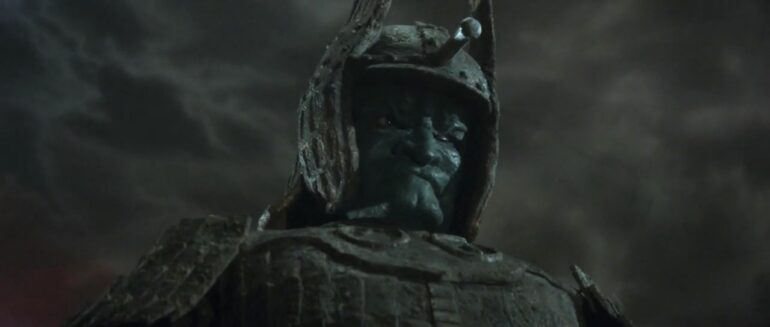Summary
Daimajin is slow-moving, but the last ten minutes are terrific and action-packed, and the cinematography is top-notch.
Plot: Two children of a slain samurai retake their father’s fortress with the help of a deity inhabiting a stone samurai statue.
Review: Japan loves their kaiju films. Godzilla, Gamera, Ultraman…the land of the rising sun like their characters larger than life – literally. Daimajin, a film trilogy, didn’t last as long as those other franchises, but it’s evident that the filmmakers were big fans of the genre.
The story is alright. At 84 minutes, with the kaiju only showing up in the last ten minutes, you need a decent story. This one covers the betrayal of a benevolent samurai, which causes his two children to swear vengeance. It’s…okay. I wouldn’t say it was original or memorable, but it does the job—in this case, to establish why the kaiju needs to be called.
Even at 84 minutes, though, the movie drags. Considering the ousting and murder of the samurai happen within the first fifteen minutes of the film, and the final ten minutes are the kaiju wreaking havoc, that’s almost an hour of just waiting for stuff to happen. That’s a long time. This was a longer 84 minutes than it needed to be.
As for the characters, they’re serviceable. The usurper who claims the samurai’s fortress is a right bastard and seems to relish his role with gusto, equivocally fulfilling the requisite mustache-twirling villain. The heroes are heroic, as you would expect. I think the two characters that stand out are Kozawa, the daughter of the deposed samurai and Kogenta, the noble samurai who helps the two children escape. Above all other characters, these two are the emotional anchors of the film. Their absence would have meant the spark, the reason to watch the hour between the siege of Hanabusa’s fortress and the Diamajin’s appearance that much less tolerable.
The Daimajin itself is an impressive creation, and I thought the makeup job on the actor’s face to turn him into the angry god interesting and original. The kaiju destroying everything in sight at the end of the movie was a thing of beauty—I particularly liked him walking around with the bad guy in his grip at the end of the film as if he was taking a stroll in the park with his favourite toy. The cinematography was better than I expected, with several shots showing the beauty of the locations, including a stunning waterfall. The score was both ominous and memorable, perfectly setting up the action you see on screen.
Would I recommend Daimajin? Sure, why not? You get a monster rampaging at the end of the movie, creating chaos, and before then, you get a tale of loss and heroism, true evil and noble sacrifice, all beautifully shot. I’ve seen a lot worse than Daimajin, and I look forward to seeing the movie’s two sequels.


